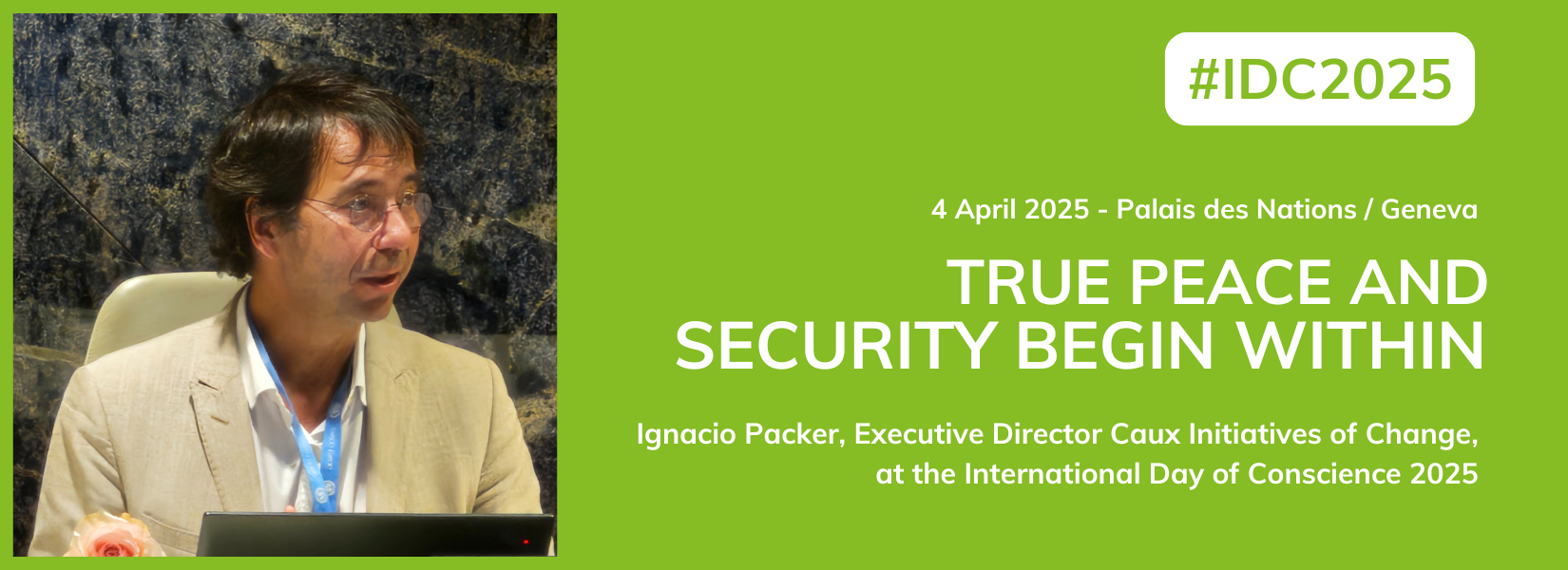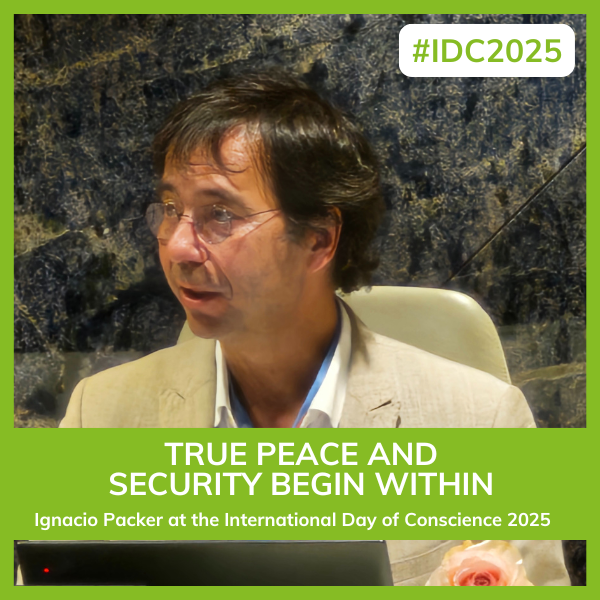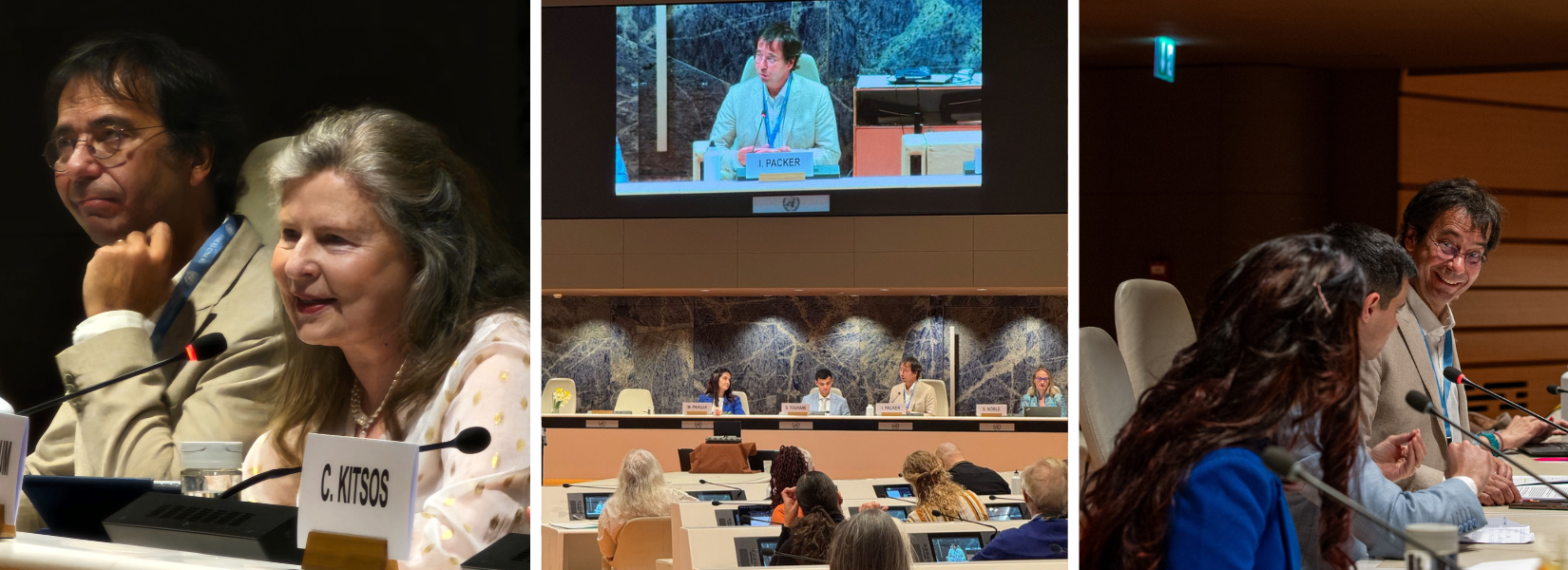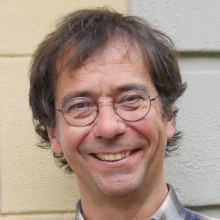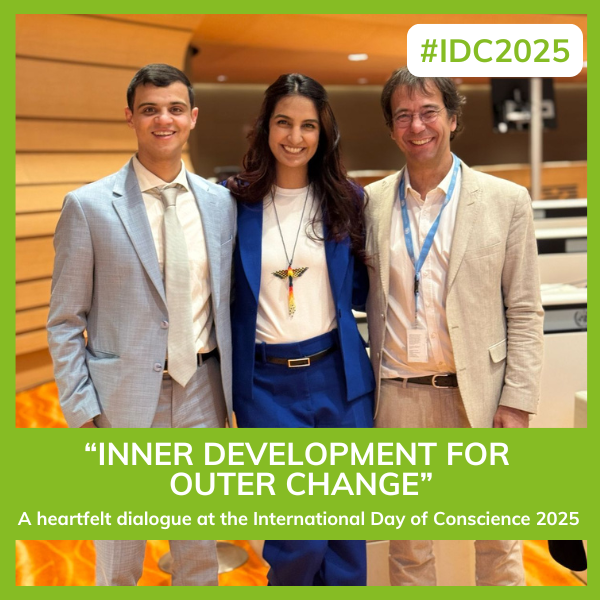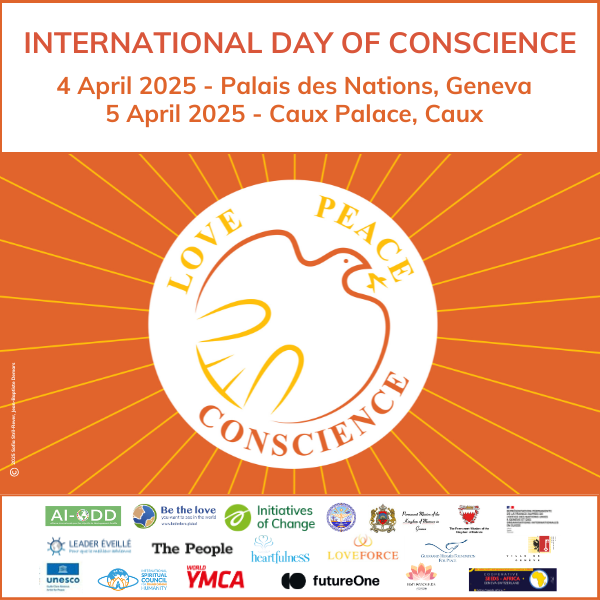International Day of Concience 2025: True Peace and Security Begin Within
By Ignacio Packer, Executive Director Caux Initiatives of Change
15/04/2025
On 4 April 2025, the Caux Initiatives of Change Foundation hosted a remarkable event at the Palais des Nations in Geneva: the International Day of Conscience 2025. Co-organised by Sofia Stril-Rever (BeTheLove), Pascale Fressoz (AI-ODD), and the Caux Initiatives of Change Foundation, the event brought together over 250 participants and more than 45 speakers, including representatives of the UN, UNESCO, Permanent Missions, governments, Geneva, civil society, spiritual leaders, and visionary youth. Together, they shared powerful messages of conscience, love, and peace—at a time when the world is urgently searching for meaning and hope.
Ignacio Packer, Executive Director of the Caux Initiatives of Change Foundation, delivered the following inspiring opening address:
The Importance of Conscience and a Strong Moral Compass in Today's World
The new US administration has accelerated the use of an assertive hard power strategy to foreign policy. This shift in American policy has raised significant concerns across Europe, prompting nations to prioritize rearmament and respond to escalating trade tensions.
On 4 March, the European Commission introduced the ReArm Europe Plan, a €800 billion initiative to bolster EU defense expenditures over four years.
Shortly after, on 14 March, Germany's conservative Chancellor-in-waiting, Friedrich Merz, secured backing to amend the nation’s constitutional debt limits, enabling a historic €1 trillion investment in defense and infrastructure.
Despite these developments, European leaders and the public appear unprepared for the new geopolitical landscape. How much of the policy discourse is driven by emotional reactions rather than long-term strategic planning? Are we not being led by decisions that lack a coherent vision for a peaceful future?
We are witnessing a shift not only toward military rearmament but also economic warfare, where sanctions, resource control, and strategic alliances serve as instruments of power. This competition for dominance risks deepening global divisions and conflicts.
...an urgent need for a moral and ethical compass.
Yet, what is often overlooked in discussions of military and economic strength is the urgent need for a moral and ethical compass. How are we equipping ourselves with the values and skills essential for lasting peace? While nations focus on strengthening their armed forces and economic leverage, true stability depends on the principles that guide their leaders and citizens.
The organisation I have the privilege of working for, Caux Initiatives of Change, is committed to the belief that personal transformation is key to global change. Ethical leadership, trust, reconciliation, and peacebuilding must be rooted in a conscious commitment to truth and justice—principles that shape both domestic policies and international relations.
A sustainable future requires individuals to cultivate responsibility, honesty, and compassion—qualities that foster trust within communities and between nations. Without a firm dedication to these principles, military power and economic strength alone cannot guarantee peace; rather, they risk fueling further division and conflict.
History has shown that societies thrive not only through strategic defense but through the moral character of their people. Leaders who act with integrity inspire confidence, and nations that prioritize ethical conduct earn global respect. Alongside military preparedness and economic warfare, there must be an equally determined effort to revive core values such as mutual respect, dialogue, and a genuine pursuit of the common good.
True security is not merely about defending borders. It is about upholding the moral and ethical principles that sustain unity, justice, and peace through conscious and deliberate action.
Ethical leadership, trust, reconciliation, and peacebuilding must be rooted in a conscious commitment to truth and justice.
Marking the International Day of Conscience
As we mark the International Day of Conscience, let this be a moment of reflection - a call to examine the values that shape our decisions and the kind of future we are building. This day reminds us that true peace and security begin within, rooted in integrity, responsibility, and a shared commitment to the common good.
And let this be just the beginning. Caux Initiatives of Change is part of a global people’s movement dedicated to trust building, reconciliation, and peacebuilding. We believe that personal transformation and a strong moral and spiritual compass is essential in navigating today’s challenges.
I invite you to take part in this journey by joining one of our upcoming events at the beautiful and inspiring Caux Palace near Montreux. This May, our Caux Arts and Peace Encounters will explore how we can foster peace through the power of arts and dialogue, while this summer, the Caux Forums for Democracy and Inner Development offer a space for changemakers to learn, reflect, and take meaningful action to address our world’s pressing challenges.
Change begins with the courage to listen to our conscience—let’s take that step together.
Personal transformation and a strong moral and spiritual compass is essential in navigating today’s challenges. (...) Let this be just the beginning!
What is the International Day of Conscience?
The International Day of Conscience (IDC25) on 5 April has been established in 2019 by the General Assembly of the United Nations to invite all human beings to focus their minds every year on how to build « a culture of peace with love and conscience ». With this resolution (A/RES/73/329), the General Assembly emphasized the urgent necessity of a mindset shift to address the global challenges facing the human family, including issues such as poverty and hunger which kills a child’s life every eleven seconds. This radical shift of mindset is highlighted by the reference to love enshrined for the first time in a UN resolution.
Furthermore, despite ongoing international tensions, in September 2024 all UN Member States signed up a Pact for the Future, to set themselves "on a path towards a brighter future for all of humanity". They pledged "a new beginning in multilateralism" based on the UN Charter and the Universal Declaration of Human Rights.
They reaffirmed their "enduring commitment to the 2030 Agenda" adopted in 2015, whose 17 SDGs have been jeopardized by the implementation gap that followed. Governments unanimously renewed their commitment to Leave No One Behind and established this guiding principle for all components of civil society. Indeed, no government acting on its own can achieve the 2030 Agenda. Its success depends on each and everyone of us.
The International Day of Conscience (IDC) 2025 offered the opportunity to reflect and plan to act on what we can do to Leave No One Behind.
__________________________________________________________________________
IGNACIO PACKER is Executive Director of the Caux Initiatives of Change Foundation, a Swiss private charitable foundation with the mission to provide a safe and privileged space to inspire, equip and connect individuals, groups and organizations from around the globe to engage effectively and innovatively in the promotion of trust, ethical leadership, sustainable living and human security. Ignacio has over 30 years of experience in humanitarian work and development issues. He is an expert on human rights and social issues and has been strongly engaged in global advocacy on protection frameworks for migrants and refugees with a particular focus on children and youth.
Photos: Antonin Lechat, U. Ott Chanu
